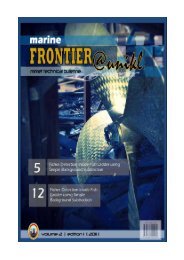click here to download - UniKL MIMET Official Website
click here to download - UniKL MIMET Official Website
click here to download - UniKL MIMET Official Website
Create successful ePaper yourself
Turn your PDF publications into a flip-book with our unique Google optimized e-Paper software.
mutually exclusive, but rather compatible and<br />
dependent on one another. Changes occur, as do<br />
positive results.<br />
Playing <strong>to</strong> people's strengths:<br />
Leaders know their people and effectively match<br />
talent and task. Matching talent and task helps<br />
reduce wasted talent. Overly talented people<br />
may however complement those less talented <strong>to</strong><br />
help in the smooth running of departments<br />
within <strong>UniKL</strong>. Leaders understand their people's<br />
strengths and how best <strong>to</strong> elicit these strengths<br />
from them. These organizational members focus<br />
more on building synergies, learning and build‐<br />
ing on strengths and opportunities that help re‐<br />
duce internal weaknesses and neutralizing exter‐<br />
nal threats rather than on merely closing gaps<br />
that may only help address current problems,<br />
not potential or future problems.<br />
CORE VALUES AND STANDARDS BEHAVIOR OF<br />
EXCELLENCE (SBE)<br />
Core values are the primary or dominant<br />
values that are accepted throughout the organi‐<br />
zation. In striving for high performance culture,<br />
<strong>UniKL</strong> had chosen a strong culture that has a<br />
greater impact on employee behavior. It is ob‐<br />
served that <strong>UniKL</strong>’s strong culture results in the<br />
organization’s core values being both intensely<br />
held and widely shared by organizational mem‐<br />
bers. Consistently, a strong culture can have a<br />
great influence on the behavior of its members<br />
because its high degree of sharing and intensity<br />
creates an internal climate of high behavioral<br />
control.<br />
The five (5) primary or dominant core values that<br />
are intensely held and widely shared by organ‐<br />
izational members throughout the organization<br />
are identified as commitment, integrity, team‐<br />
work, innovation and excellence. These core val‐<br />
ues form the basis for the performance appraisal<br />
<strong>MIMET</strong> Technical Bulletin Volume 1 (2) 2010<br />
of organizational members with respect <strong>to</strong> the<br />
Key Performance Index (KPI) of <strong>UniKL</strong>. Under<br />
each core value <strong>UniKL</strong> further itemizes three (3)<br />
sub‐performance dimensions known as Stan‐<br />
dards Behavior of Excellence (SBE) that provides<br />
a measurement on a Scale of 1 <strong>to</strong> 5. Thus, the<br />
performance of every organizational member of<br />
<strong>UniKL</strong> can be measured and weaknesses cor‐<br />
rected <strong>to</strong> ensure that <strong>UniKL</strong>’s quest for high per‐<br />
formance culture organization can be achieved<br />
and maintained by its organizational members.<br />
The core values and their sub‐performance di‐<br />
mensions are as listed below;<br />
�� Commitment<br />
�� Punctual.<br />
�� Gets things done<br />
�� Delivers results<br />
�� Integrity<br />
�� Honest.<br />
�� Honors promises.<br />
�� Complies with rules and regula‐<br />
tions.<br />
�� Teamwork<br />
�� Cooperative.<br />
�� Provides support.<br />
�� Puts organization first<br />
�� Innovation<br />
�� Competitive.<br />
�� Generates and shares ideas.<br />
�� Makes things better<br />
�� Excellence<br />
�� Passionate.<br />
�� Performs beyond expectation.<br />
�� Strives <strong>to</strong> be the best<br />
| MARINE FRONTIER @ <strong>UniKL</strong><br />
99



